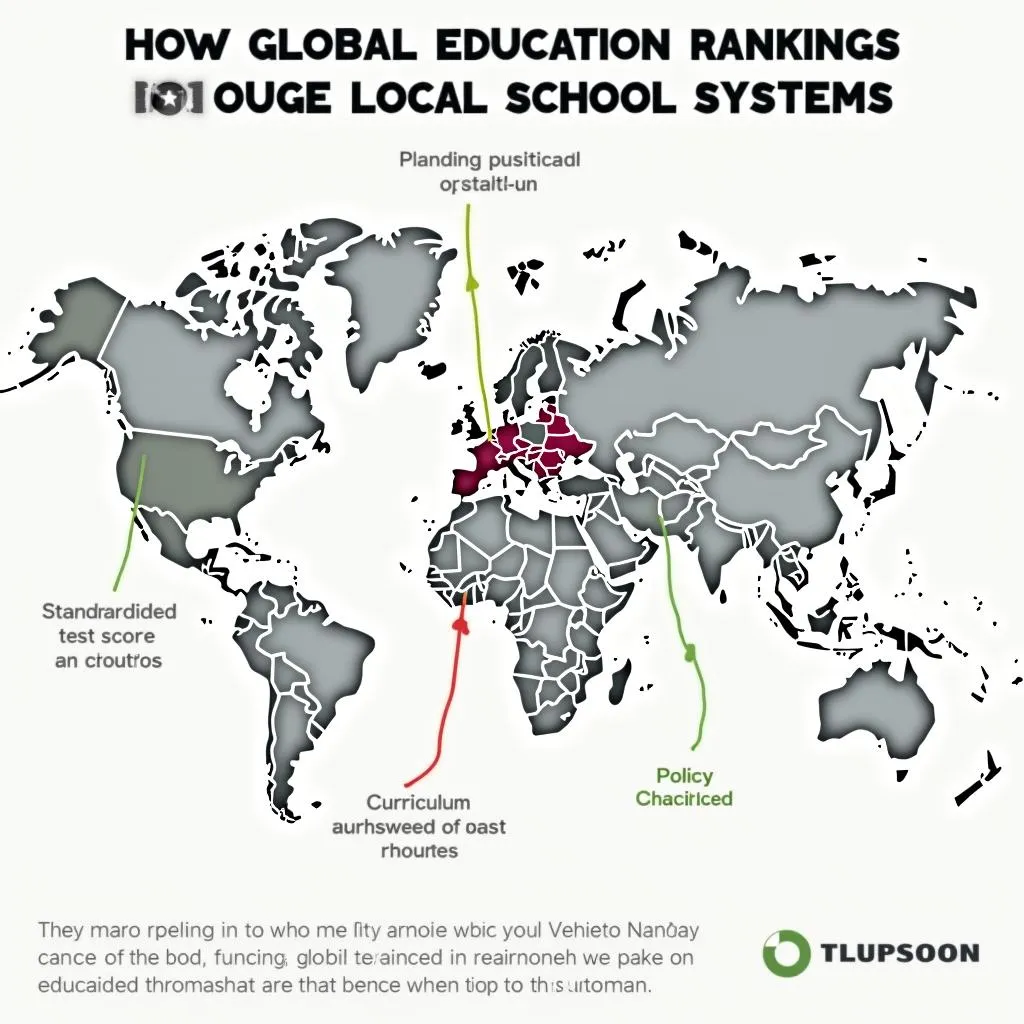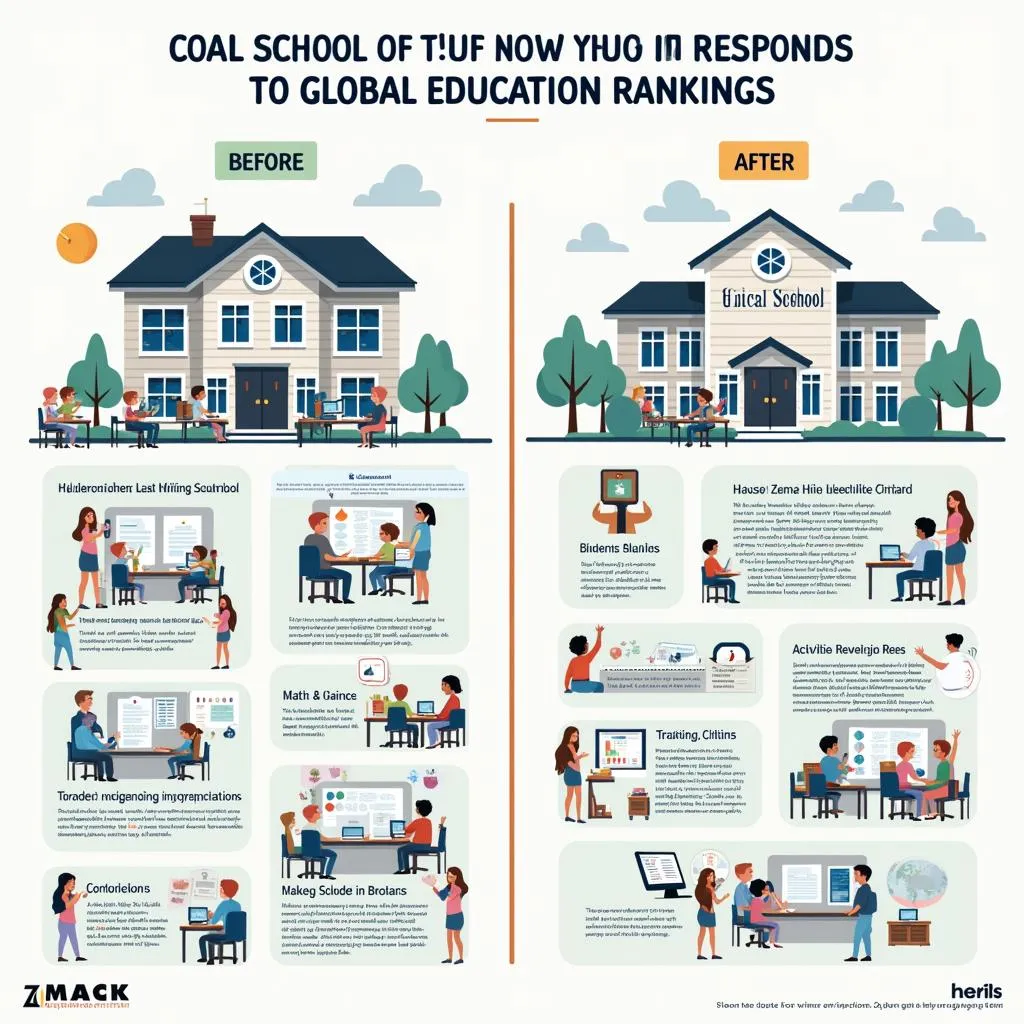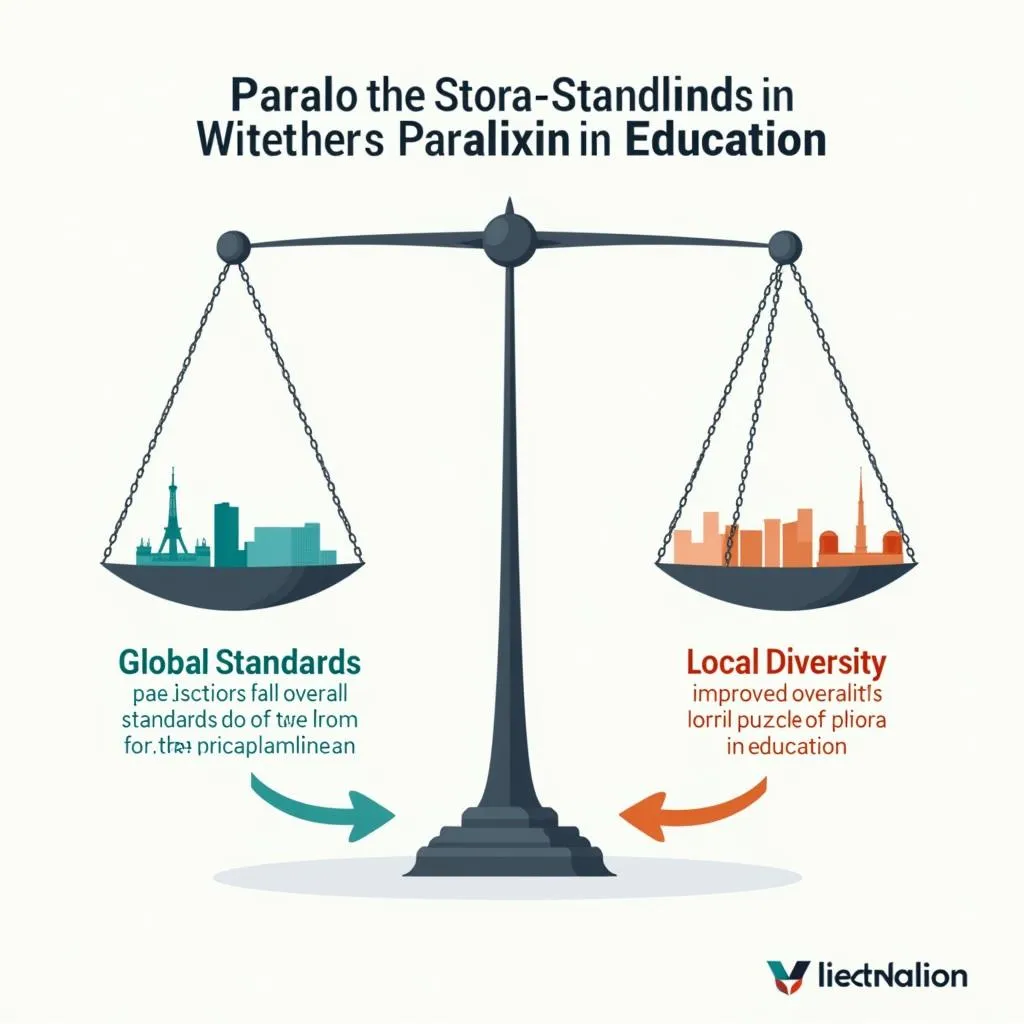The influence of global educational rankings on local school systems has become a hot topic in recent years. As an experienced IELTS instructor, I’ve prepared a comprehensive Reading test to help you sharpen your skills while exploring this fascinating subject. Let’s dive into the passages and questions that will challenge your understanding and analytical abilities.
The impact of cultural values on education systems is closely related to how global rankings affect local schools. As you work through these passages, consider how different cultures respond to international comparisons and the resulting pressure on their educational institutions.
Passage 1 – Easy Text
The Rise of Global Education Rankings
In recent decades, international education rankings have gained significant prominence in shaping educational policies worldwide. Organizations such as the Programme for International Student Assessment (PISA), run by the Organisation for Economic Co-operation and Development (OECD), have become influential barometers of educational performance across countries. These rankings, based on standardized tests in subjects like mathematics, science, and reading, have profound implications for how nations perceive their education systems and formulate reforms.
The impact of these rankings is far-reaching. Governments often use them as benchmarks to assess their education systems’ effectiveness and to justify policy changes. High-performing countries like Finland, Singapore, and South Korea have become models for others to emulate, leading to a global exchange of educational practices and ideas. However, this trend has also sparked debate about the validity of comparing diverse education systems and the potential drawbacks of a one-size-fits-all approach to assessment.
Critics argue that these rankings can oversimplify complex educational landscapes and may not adequately account for cultural and socioeconomic differences between countries. There are concerns that an overemphasis on rankings could lead to a narrowing of curriculum focus, with schools prioritizing test performance over broader educational goals. Despite these criticisms, the influence of global rankings continues to grow, shaping educational discourse and policy-making around the world.
 The impact of global education rankings on local school systems
The impact of global education rankings on local school systems
Questions 1-5
Do the following statements agree with the information given in the passage? Write
TRUE if the statement agrees with the information
FALSE if the statement contradicts the information
NOT GIVEN if there is no information on this
- PISA is the only organization that conducts international education rankings.
- High-performing countries in these rankings have become educational role models for other nations.
- All countries have embraced global education rankings without criticism.
- Some critics believe that global rankings may not fully consider cultural differences between countries.
- The influence of global education rankings has decreased in recent years.
Questions 6-10
Complete the sentences below. Choose NO MORE THAN TWO WORDS from the passage for each answer.
- International education rankings have become __ of educational performance across countries.
- Governments often use these rankings as __ to evaluate their education systems.
- Some argue that an overemphasis on rankings could lead to a __ of curriculum focus.
- Critics suggest that global rankings may __ complex educational landscapes.
- Despite criticisms, global rankings continue to shape educational __ worldwide.
Passage 2 – Medium Text
The Ripple Effect: How Global Rankings Reshape Local Education
The pervasive influence of international education rankings has triggered a cascade of changes in local school systems worldwide. As countries vie for top positions in these global comparisons, the repercussions are felt at every level of education, from national policy to individual classrooms. This phenomenon has led to a recalibration of educational priorities and practices, often with mixed results.
One of the most significant impacts is the standardization of curriculum and assessment methods. Countries seeking to improve their rankings often adopt elements from high-performing nations, leading to a certain degree of homogenization in global education. This trend has its merits, as it can lead to the adoption of proven effective practices. However, it also raises concerns about the potential loss of cultural diversity in education and the erosion of local educational traditions.
The pressure to perform well in these rankings has also led to increased investment in education in many countries. Governments have allocated more resources to schools, teacher training, and educational technology. While this can be seen as a positive outcome, it has also led to a disproportionate focus on subjects that are typically measured in international assessments, such as mathematics and science, potentially at the expense of other important areas like arts and humanities.
Moreover, the rankings have influenced pedagogical approaches. There’s been a shift towards more data-driven decision-making in education, with schools and teachers increasingly focused on quantifiable outcomes. This has led to the implementation of more frequent standardized testing at local levels, mirroring the international assessments. Critics argue that this approach may stifle creativity and critical thinking skills that are not easily measured by standardized tests.
The impact on teachers and students is equally profound. In some countries, there’s increased pressure on educators to produce high-performing students, leading to longer school hours and more intensive study regimens. This has raised concerns about student well-being and the holistic development of children. Additionally, the emphasis on rankings has, in some cases, exacerbated educational inequalities, as resources are often channeled to high-performing schools or students to boost overall national scores.
 Changes in local education systems due to global rankings
Changes in local education systems due to global rankings
Despite these challenges, proponents argue that global rankings have brought much-needed attention to education quality and have spurred positive reforms in many countries. They contend that the competitive element introduced by these rankings has motivated countries to strive for excellence in education, leading to improved learning outcomes for students globally.
As the debate continues, it’s clear that the influence of global educational rankings on local school systems is a complex and multifaceted issue. While they have undoubtedly brought about significant changes, the long-term implications of these transformations remain to be seen. How global education rankings affect cultural perceptions is an ongoing area of study, as educators and policymakers grapple with balancing international standards and local educational needs.
Questions 11-14
Choose the correct letter, A, B, C, or D.
-
According to the passage, one effect of global rankings on local education systems is:
A) A complete rejection of international educational practices
B) An increase in cultural diversity in education
C) A tendency towards standardization of curriculum and assessment
D) A decrease in government spending on education -
The passage suggests that the focus on subjects measured in international assessments:
A) Has led to a balanced curriculum in all subjects
B) May result in neglect of arts and humanities
C) Has decreased interest in mathematics and science
D) Has no effect on other subjects -
The author implies that the shift towards data-driven decision-making in education:
A) Always improves critical thinking skills
B) Has no effect on teaching methods
C) May have negative effects on creativity
D) Is universally accepted by educators -
According to the passage, the impact of global rankings on educational inequality is:
A) It has completely eliminated inequality
B) It has had no effect on inequality
C) It has reduced inequality in all cases
D) It may have worsened inequality in some instances
Questions 15-19
Complete the summary below. Choose NO MORE THAN TWO WORDS from the passage for each answer.
Global education rankings have had a significant impact on local school systems worldwide. One major effect is the (15) __ of curriculum and assessment methods across different countries. This has led to concerns about the potential (16) __ of local educational traditions. The rankings have also resulted in increased (17) __ in education in many countries, although this has often focused on subjects measured in international assessments. There’s been a shift towards more (18) __ in education, which some argue may negatively affect skills not easily measured by tests. Despite challenges, proponents argue that the (19) __ introduced by these rankings has motivated countries to improve their education systems.
Passage 3 – Hard Text
The Paradox of Progress: Unintended Consequences of Global Educational Rankings
The advent of global educational rankings has ushered in an era of unprecedented scrutiny and comparison in education systems worldwide. While ostensibly designed to foster improvement and share best practices, these rankings have inadvertently triggered a series of complex and often contradictory outcomes. This phenomenon, which we might term the “ranking paradox,” has far-reaching implications for educational policy, pedagogy, and the very fabric of local school systems.
At the heart of this paradox lies the tension between the homogenizing tendency of global standards and the diverse realities of local contexts. As nations scramble to climb the rungs of international league tables, there’s a palpable risk of educational isomorphism – a convergence towards a single, ostensibly optimal model of education. This trend, while potentially beneficial in raising overall standards, threatens to erode the rich tapestry of educational diversity that has historically been a wellspring of innovation and cultural expression.
The metrics-driven approach championed by global rankings has catalyzed a shift towards what might be termed “educational reductionism.” Complex educational processes and outcomes are increasingly distilled into quantifiable indicators, often at the expense of less tangible but equally crucial aspects of learning. This reductionist tendency can lead to a narrowing of the curriculum, with subjects and skills that are not directly measured by international assessments being marginalized or neglected entirely.
Moreover, the rankings have engendered a form of educational Darwinism, where the pressure to perform well in international comparisons drives a relentless pursuit of incremental gains in test scores. This hyper-competitive environment can lead to unintended consequences, such as teaching to the test, gaming the system, or even outright cheating. The collateral damage of this approach is often borne by students, who may find themselves subjected to increased stress and a learning experience that prioritizes performance over genuine understanding and personal growth.
 The paradox of global educational rankings
The paradox of global educational rankings
The influence of rankings extends beyond the classroom, reshaping the broader educational ecosystem. There’s a growing tendency towards what might be called “policy mimicry,” where countries uncritically adopt practices from high-performing nations without due consideration of contextual differences. This can lead to a misalignment between imported educational policies and local cultural, socioeconomic, and institutional realities, potentially undermining the effectiveness of well-intentioned reforms.
Furthermore, the rankings have contributed to a reconfiguration of educational priorities at a national level. In many countries, there’s an observable trend towards centralizing control over education, with governments assuming a more directive role in curriculum design and pedagogical approaches. While this can lead to more coherent and standardized educational experiences, it may also stifle local innovation and adaptability.
The ranking paradigm has also had profound effects on the teaching profession. The increased emphasis on measurable outcomes has led to a shift in the perception of teachers’ roles, often reducing them to implementers of standardized curricula rather than autonomous professionals. This de-professionalization of teaching can have deleterious effects on teacher morale, creativity, and ultimately, the quality of education provided to students.
Paradoxically, while global rankings aim to improve educational quality worldwide, they may inadvertently exacerbate educational inequalities. High-stakes international comparisons can lead to a concentration of resources in schools or districts that are more likely to boost a country’s ranking, potentially neglecting disadvantaged areas and widening the achievement gap.
Despite these challenges, it would be remiss to dismiss the potential benefits of global educational rankings entirely. They have undeniably brought education to the forefront of national agendas, spurring increased investment and attention to educational quality. The challenge lies in harnessing the motivational power of rankings while mitigating their negative effects.
As we navigate this complex landscape, it becomes imperative to adopt a more nuanced approach to global educational comparisons. This might involve developing more comprehensive and culturally sensitive assessment methods, placing greater emphasis on qualitative aspects of education, and fostering a global dialogue that values diversity in educational approaches.
How education reforms can bridge the achievement gap is a crucial consideration in this context. By critically examining the influence of global rankings and implementing thoughtful reforms, we can work towards an educational paradigm that balances the benefits of international standards with the richness of local educational traditions.
In conclusion, the influence of global educational rankings on local school systems presents a complex paradox of progress. While these rankings have undoubtedly sparked a global conversation about educational quality, their unintended consequences challenge us to rethink our approach to assessment, policy-making, and the fundamental goals of education in an interconnected world.
Questions 20-23
Choose the correct letter, A, B, C, or D.
-
The author uses the term “ranking paradox” to describe:
A) The consistent improvement in global education standards
B) The contradictory outcomes resulting from global educational rankings
C) The failure of rankings to measure educational quality
D) The success of top-performing countries in maintaining their positions -
According to the passage, “educational isomorphism” refers to:
A) The diversity of educational models worldwide
B) The tendency for education systems to become more similar
C) The process of ranking educational institutions
D) The resistance to change in traditional education systems -
The author suggests that the metrics-driven approach of global rankings can lead to:
A) A comprehensive evaluation of all aspects of education
B) An overemphasis on easily quantifiable aspects of learning
C) A balanced focus on all school subjects
D) An increase in innovative teaching methods -
The passage indicates that “policy mimicry” in education can result in:
A) Successful adaptation of foreign educational practices
B) Improved international relations through education
C) Potential mismatch between adopted policies and local contexts
D) Rapid improvement in a country’s ranking position
Questions 24-26
Complete the sentences below. Choose NO MORE THAN TWO WORDS from the passage for each answer.
-
The author argues that the ranking system has led to a form of __ in education, where there is intense competition for improved test scores.
-
According to the passage, teachers are increasingly viewed as __ rather than autonomous professionals due to the emphasis on standardized curricula.
-
The author suggests that global rankings may unintentionally __ by concentrating resources in areas more likely to improve a country’s overall ranking.
Questions 27-30
Do the following statements agree with the claims of the writer in the passage? Write
YES if the statement agrees with the claims of the writer
NO if the statement contradicts the claims of the writer
NOT GIVEN if it is impossible to say what the writer thinks about this
- Global educational rankings have had only negative effects on local school systems.
- The pressure to perform well in rankings has led to increased stress for students in some cases.
- All countries have experienced a centralization of control over education as a result of global rankings.
- Developing more culturally sensitive assessment methods could help address some of the challenges posed by global rankings.
Answer Key
- FALSE
- TRUE
- FALSE
- TRUE
- FALSE
- influential barometers
- benchmarks
- narrowing
- oversimplify
- discourse
- C
- B
- C
- D
- standardization
- loss
- investment
- data-driven decision-making
- competitive element
- B
- B
- B
- C
- educational Darwinism
- implementers of standardized curricula
- exacerbate educational inequalities
- NO
- YES
- NOT GIVEN
- YES
This comprehensive IELTS Reading test explores the complex topic of global educational rankings and their impact on local school systems. By working through these passages and questions, you’ll not only improve your reading skills but also gain insights into a crucial aspect of modern education. Remember to practice time management and develop strategies for different question types to excel in your IELTS Reading test.


